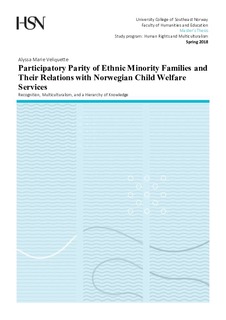Participatory Parity of Ethnic Minority Families and Their Relations with Norwegian Child Welfare Services Recognition, Multiculturalism, and a Hierarchy of Knowledge
Master thesis
Permanent lenke
http://hdl.handle.net/11250/2560957Utgivelsesdato
2018Metadata
Vis full innførselSamlinger
Sammendrag
Public discourse, international demonstrations, and human rights monitoring mechanisms have expressed concern over the relationship between ethnic minority families and Norwegian child welfare services (CWS). This thesis explores the ability of ethnic minority parents to participate on par in the realms of child welfare, familial life, and within the community, considering the current relations of ethnic minority parents and CWS. The study is framed considering theories of social justice, recognition, multiculturalism, and a hierarchy of knowledge. A theoretical thematic analysis was applied to semi-structured interviews with ethnic minority parents and child welfare practitioners to generate themes relating to participatory parity and (mis)recognition. The generated themes and sub-themes: knowledge hierarchy, expectations, cultural superiority, Norwegian way not the only way, and intersecting identities provide insights to the present dynamics between ethnic minority parents and CWS in the municipality of Drammen. Based on these findings, I argue the current relationship continues to perpetuate the disproportionality of ethnic minorities in the child welfare system and appears to demand one-way cultural adaptation on behalf of the parents. Even when individual practitioners are concerned about the positive experiences of ethnic minority families within the CWS, inequitable outcomes continue to be reproduced. Using participatory parity as a measuring standard, the child welfare system reproduces cultural hierarchies; becoming the same is described as the price for equal respect. Critical theories of recognition, participatory parity, multiculturalism, hierarchy of knowledge, and intercultural dialogue provide insights for moving forward
